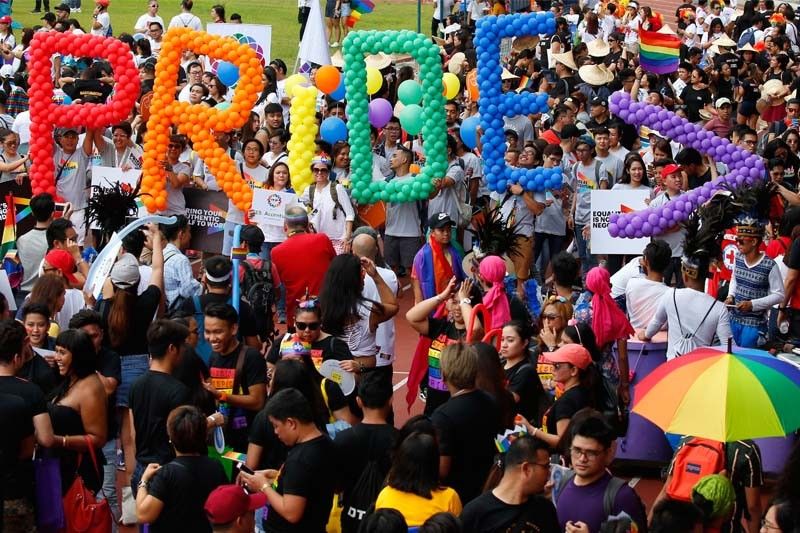LGBTQ research hub aims to counter gender-based discrimination through scholarship

MANILA, Philippines — A first-of-its-kind research hub focusing on LGBTQ scholarship has opened at the University of the Philippines Diliman with the goal of challenging gender biases and prejudices with evidence and data.
Faculty members of the UP School of Statistics and other academics and gender advocates have established the UP Rainbow Research Hub, a platform that will host open educational resources and materials to support teaching and research on LGBTQ issues.
The pioneer resource hub ultimately aims to pave the way for better LGBTQ scholarship and research and "make a difference" for the community it will support, said Xavier Javines Bilon, a faculty member at the UP School of Statistics.
“We achieve this by supporting students’ access to knowledge and expanding educators’ arsenal of teaching materials through our accessible open educational resources in doing LGBTQ research,” Bilon said in a press release by UP.
Bilon said that the UP Rainbow Research Hub is the first research resource hub of its kind in the Philippines and possibly the whole region.
"While other LGBTQI-related resource hubs exist (for example, balangaw.ph of Babaylanes, Inc.), the UP Rainbow Research Hub is unique as it aims not only to raise awareness on LGBTQI issues, but help in discovering and generating new knowledge that empowers LGBTQI Filipinos," Bilon told Philstar.com in an email interview.
After holding a well-received LGBTQ research webinar in June 2021, the Rainbow Research Hub team spent two years working with LGBTQ community members, non-government organizations, and fellow scholars to create the hub, Bilon said.
"During the event, we saw that a lot of students, teachers, and researchers who attended wanted to enhance their research skills to better understand the issues and experiences of LGBTQI Filipinos," he said.
The UP Rainbow Research Hub’s website currently contains six video lectures and four journal articles covering a range of topics on gender and sexuality. It features the following resources, among others:
- A video lecture sexual orientation, gender identity, gender expression and sex characteristics
- A primer introducing SOGIESC framework, inclusive terminology guide and glossary
- A video lecture on the overview of LGBTQ rights, lives and welfare, with a comprehensive discussion on criminalization, protection and recognition
- An analysis of the incidence and nature of everyday sexism in Filipino women’s lives
- An article exploring lives of poor “bakla” (gay) youth, highlighting unique and shared experiences of discrimination
- Ethical and practical considerations in conducting LGBTQ research
- The history of pride march in the Philippines
RELATED: 30 years later: Filipinas who marched in first lesbian pride recall historic milestone
“We cover the basics, such as introduction to basic concepts in gender and sexuality, and the more advanced topics, like intersectionality,” Bilon said.
The research hub will also make available the following resources next:
- A video lecture on being intersex in the Philippines, the implications of the Cagandahan vs. Court of Appeals decision and improving social conditions for the community
- A video lecture on defining LGBTQ Populations, including tips, sampling techniques, and the importance of LGBTQ research on policy
“By generating reliable data and empirical evidence, researchers can challenge discriminatory narratives and provide a more accurate understanding of sexual orientation, gender identity, and expression,” UP Center for Women’s and Gender Studies Director Marby Villaceran said.
Bilon said that the team behind the hub plans to create new resources needed by students and educators in doing LGBTQI research and partner with other institutions who can fund emerging areas in LGBTQI research that would eventually lead to policies and programs that empower the community.
Need for robust monitoring, data collection
A 2014 study detailing the experiences of LGBT persons in the Philippines said that the lack of robust monitoring and evaluation of LGBTQ-focused policies, as well as the absence of a national database, has hampered access to knowledge on gender and sexuality.
The US Agency for International Development's report "Being LGBT in Asia: The Philippines Country Report” found that LGBT organizations struggle to “clearly distinguish what efforts have already been done or have yet to be accomplished, accompanied by little understanding of the real impact of their efforts on LGBT rights.”
“As such, activities overlap at times and are duplicated with others. Without a strategic LGBT rights agenda, the advocacy in the Philippines does not respond to the needs of the community,” the report stated.
Similarly, the study also found that several LGBTQ persons recognize the need for a centralized database that will “serve as central repository of LGBT-related information in the Philippines.”
“To date, organizations tend to work independently of each other, and even within organizations, the transfer of knowledge is problematic. A centralized database is seen as necessary for LGBT Filipinos to have access to needed LGBT-related information,” the study stated.
A wave of falsehoods about gender and sexuality, particularly the SOGIE bill in Congress, were spread by a number of Facebook groups and pages in 2023, as documented in a Rappler investigation of the #NoToSogieBill campaign.
According to the Rappler report, the most prominent falsehoods included misleading narratives related to religious freedom, false claims of outrageous penalties in the SOGIE bill for discriminatory acts and repression of schools’ academic freedom, among others.
- Latest
- Trending


























